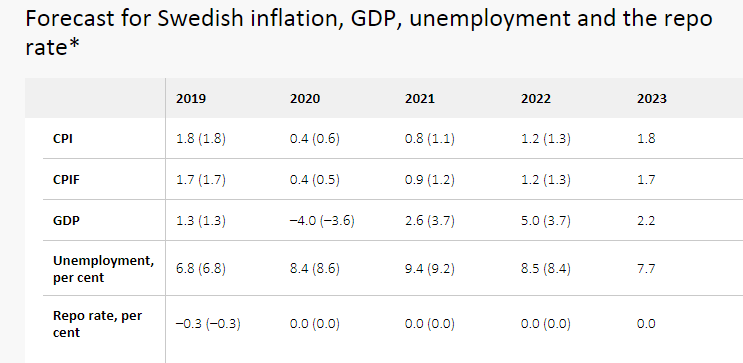Swedish Krona Wounded by Riksbank but Global Recovery, ECB to Push EUR/SEK Below 10.0
- Written by: James Skinner

Image © Adobe Images
- GBP/SEK spot rate at time of writing: 11.38
- Bank transfer rate (indicative guide): 10.99-11.07
- FX specialist providers (indicative guide): 11.21-11.28
- More information on FX specialist rates here
The Krona was walking wounded on Thursday after the Riksbank expanded its quantitative easing programme, although local as well as international analysts still see the Swedish currency as likely to achieve new highs against the Euro and other rivals in the months ahead.
Sweden's central bank said on Thursday that the country's increased spread of infection and associated tightening of restrictions on activity would lead to a fresh downturn in the economy, before announcing an expansion of its government bond buying programme in response.
"The repo rate is held unchanged at zero percent and is expected to remain at this level in the coming years. By expanding and extending," the bank said, referring to Sweden's main interest rate, which was been lifted steadily since the middle of 2018 from a low point of -0.5%.
The Riksbank added SEK 200 billion (£18 bn) to its quantitative easing programme, an amount equivalent to around five percent of national economic output, taking the programme's total size up to SEK 700 bn.
"The Executive Board has also decided to increase the pace in the asset purchases during the first quarter of 2021, in relation to the fourth quarter of 2020. The programme now also includes treasury bills, and sovereign and municipal green bonds," the bank said.

Above: Riksbank forecasts from November.
"The expansion of its asset purchase programme shows that it will not stand idly by as the economy heads south in Q4," says David Oxley at Capital Economics. "Positive news on the vaccine front makes a future rate cut less likely in our view, and we now expect the repo rate to remain on hold throughout our forecast horizon."
The Riksbank's decision was exactly as expected by the market but that didn't stop the Swedish Krona from falling against major currencies including the Dollar, Pound, Euro and others on Thursday as investors weighed the implications for bond market returns and the Krona's outlook.
But Thursday's losses have merely served to pull the Krona back by a fraction from what were close to three-year highs. What's more, few in the market expect nascent weakness to persist for very long, while many tip new highs for the weeks ahead especially against the Euro.
"It's important to put the Riksbank's decisions into context: while the central bank will remain sensitive to SEK appreciation, the trend depreciation of the krona over recent years has led to a marked improvement in Sweden's external position. Coupled with the better outlook for global trade, EURSEK probably has further to run on the downside in terms of realignment," says Stephen Gallo, European head of FX strategy at BMO Capital Markets. "An extension of the move to levels below 10.00 is feasible."
Like others Sweden's central bank has for years fought a mostly losing battle against weakening inflation rates which it's charged with keeping steady around 2%, using its interest rate and other monetary policies, a battle that's made harder still by rising exchange rates and especially increases in the EUR/SEK exchange rate.

Above: EUR/SEK shown at daily intervals.
A strengthening Krona and falling EUR/SEK makes imports from Sweden's top trade partner, Germany, and other economies cheaper.
Cheaper imports reduce consumer prices over time and help prevent central banks from attaining their inflation goals, necessitating yet more currency-negative policies.
Expectations of a large December increase to the European Central Bank (ECB) quantitative easing programme, which Eurozone rate setters are hoping will reduce Euro exchange rates including EUR/SEK, are widely cited by analysts as one of the reasons for Thursday's move by the Riksbank.
ECB policy action and the sensitivity of Sweden's small, open economy to a burgeoning pickup in global trade are the main reasons why the EUR/SEK exchange rate has been tipped by BMO Capital Markets and some local analysts to reverse Thursday's increase before falling to new lows beneath 10.0 in the coming months.
But some are also warning that if taken to extremes, Krona strength could again see Sweden's interest rate cut back below zero. SEB, the country's second largest lender by assets in 2019, said as part of its November outlook that a EUR/SEK fall beneath 9.65 could be the trigger for exactly that action.
"Also contributing to this appreciation is that the Riksbank exhausted most of its toolkit even before the crisis struck and that the krona was deeply undervalued at the start of 2020. A weaker USD and the threat of a new ECB rate cut will create the potential for rapid SEK appreciation," says Carl Hammer, head of research for currencies, commodities and bonds at SEB. "At present, the Riksbank is not expressing any concern about the krona and is playing down the risk of a repo rate cut. We thus see potential for a continued SEK appreciation and expect the EUR/SEK rate to reach 9.85 by the end of 2021. Rate cuts may become a possibility if EUR/SEK surpasses 9.65."

Above: EUR/SEK shown at weekly intervals.




